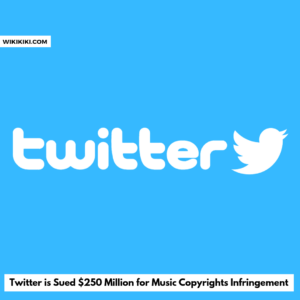Twitter has been sued by music publishers for over $250 million in damages over alleged copyright infringement. The lawsuit, filed by a group of 17 music publishers represented by the National Music Publishers’ Association, accuses Twitter of allowing users to share copyrighted songs without a license and claims that the company’s misconduct has worsened since Elon Musk purchased the company and made staff cuts.
The complaint cites more than 1,700 songs that Twitter has allegedly infringed upon, including popular hits such as Mariah Carey’s “All I Want For Christmas Is You” and Outkast’s “Hey Ya!” The lawsuit argues that Twitter’s permissiveness with copyrighted songs, combined with its promotion of tweets containing copyrighted music, has unlawfully helped fuel the company’s growth and gives it an unfair advantage over competitors who pay licensing fees for copyrighted music. Twitter has not yet responded to the lawsuit.
Also Read: UBS Completes Acquisition of Credit Suisse, Deal Worth $3.25 Billion

Music publishers have filed a lawsuit against Twitter, seeking more than $250 million in damages for alleged copyright infringement. The lawsuit claims that Twitter has allowed users to share copyrighted songs without obtaining proper licenses, thereby harming music creators and benefiting from unauthorized content. The complaint further asserts that Twitter’s misconduct has escalated since Elon Musk acquired the company and made substantial workforce reductions.
Twitter’s Alleged Copyright Infringement
According to the National Music Publishers’ Association (NMPA), Twitter has been operating as the only major social media platform that does not pay licensing fees to music labels for hosting copyrighted music. In contrast, platforms like YouTube, Snapchat, Facebook, Instagram, and TikTok have licensing agreements in place that compensate music rights holders.
The NMPA, representing 17 music publishers including Universal, Sony, and Warner Music Group, alleges that Twitter has profited from the unauthorized use of copyrighted music on its platform. The complaint highlights over 1,700 songs, including popular hits, that Twitter has allegedly infringed upon, such as Mariah Carey’s “All I Want For Christmas Is You” and Outkast’s “Hey Ya!”
The music publishers argue that Twitter’s permissive approach to copyrighted music, coupled with its promotion of tweets containing unauthorized content, has facilitated the platform’s growth while disadvantaging competitors that pay licensing fees. By allowing users to share copyrighted songs freely, Twitter enhances user engagement and advertising revenue without compensating the music creators.
Also Read: George Soros Hands Control of $25 Billion Empire to Son Alex
This allegedly gives Twitter an unfair advantage over other platforms that respect copyright laws. The complaint also highlights the layoffs that have occurred under Elon Musk’s ownership, suggesting that the reduction in staff may have exacerbated Twitter’s copyright infringement issues.
The lawsuit references Elon Musk’s prior statements on copyright, including tweets that criticize current copyright laws and the Digital Millennium Copyright Act (DMCA). Musk has expressed the belief that copyright protection extends beyond what is necessary to safeguard the original creator.
The complaint argues that these statements exert pressure on Twitter employees, particularly those in the trust and safety team responsible for addressing copyright and infringement issues. The inclusion of Musk’s views underscores the alleged culture of non-compliance with copyright regulations at Twitter.
Music Publishers
The complaint filed by the National Music Publishers’ Association seeks to rectify what it perceives as Twitter’s refusal to secure music licensing rights. It argues that Twitter has knowingly hosted and streamed infringing copies of musical compositions without obtaining proper licenses, resulting in substantial financial harm to publishers, songwriters, and the entire music ecosystem.
By monetizing infringing tweets and users through advertising, subscriptions, and data licensing, Twitter allegedly benefits at the expense of copyrighted musical compositions. The lawsuit aims to hold Twitter accountable for its alleged unlawful conduct and seeks damages totaling over $250 million.
A crucial aspect of the lawsuit involves Twitter’s major competitors, including Facebook, Instagram, and TikTok, who have entered into licensing agreements with music labels, compensating creators of musical compositions for the use of their work. The absence of such agreements on Twitter’s platform is highlighted as a key differentiator and underscores the alleged infringement and unfair advantage Twitter enjoys over its competitors.
Also Read: Coca-Cola Teams with League of Legends for +XP Flavored Drink
The music publishers’ lawsuit adds to the legal risks faced by Twitter, which is already under investigation by the US government for potential violations of privacy and security agreements with the Federal Trade Commission. These investigations, coupled with the $250 million lawsuit, place Twitter in a precarious position, as it grapples with multiple legal challenges simultaneously.
As of now, Twitter has not formally responded to the lawsuit, leaving the company’s legal strategy and potential outcomes uncertain. However, the case’s implications reach beyond the immediate dispute, raising important questions about copyright enforcement and the responsibilities of social media platforms in facilitating and regulating user-generated content.
The lawsuit filed by music publishers against Twitter for alleged copyright infringement underscores the importance of respecting intellectual property rights on digital platforms. Twitter’s purported failure to obtain licenses for copyrighted music and its promotion of unauthorized content have raised concerns about fairness, competitive advantage, and the economic well-being of music creators.
This lawsuit, along with the ongoing investigations, poses significant legal and financial risks for Twitter. The outcome of this case could set important precedents for the music industry and digital platforms, shaping the future of copyright protection and licensing practices.
As the legal proceedings unfold, the implications of this lawsuit will reverberate throughout the tech and music communities, sparking conversations about the responsibilities of digital platforms and the protection of artistic creations in the digital age.
Also Read: Microsoft Fined $20 Million for Children’s Xbox Data Privacy Breach



















+ There are no comments
Add yours